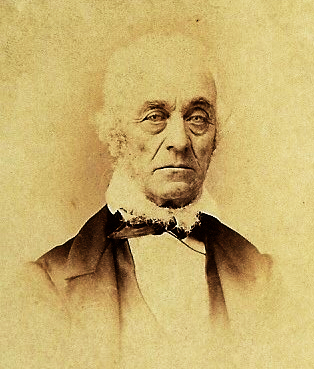“What a good father we have!”
–Lavinia Goodell, March 10, 1864
Lavinia Goodell and her father, William, shared a close relationship founded on mutual respect. William was 47 years old when Lavinia was born in 1839. His wife was 42. (Read about Lavinia’s birth here.) Their only other living child, Maria, was 12 and soon went off to school and then married, so for much of her youth Lavinia was the only child in the home.

William Goodell was a prolific writer. He was the editor of multiple abolitionist newspapers. He wrote and spoke on abolition, temperance, and women’s rights. There is no doubt that his ideals and life of scholarship and service rubbed off on Lavinia as those causes were dear to her heart as well.
During the Civil War, when Lavinia was in her early twenties, she worked alongside her father, first as a writer and later as a paid co-editor, of The Principia newspaper, which had its offices in lower Manhattan. Father and daughter were in the office when the deadly New York draft riots broke out in the summer of 1863. Although abolitionists were being specifically targeted by the angry mob, William and Lavinia “went over as usual and got out the paper.” (Read more about the draft riots here.)
Lavinia had lived with her parents in Brooklyn for many years. After the end of the war, William retired and he and his wife moved to Connecticut and lived with her sister’s family. Lavinia stayed in New York and worked as a teacher and then as an editor at the newly founded Harper’s Bazar magazine. (Read more about Lavinia’s career at Harper’s here and here.) She and her parents wrote to each other every week. While Lavinia’s correspondence with her mother tended to focus on more mundane daily matters, Lavinia and her father discussed weightier issues. William entrusted his younger daughter with details of the family’s finances. He asked her to take care of banking transactions. His letters to her would often be marked “confidential” and he would caution her not to share the imparted information with other family members.
As with any parent-child relationship, there were sometimes tensions. William Goodell was studious, serious, and judging by his writings he was doubtless a rather harsh taskmaster who did not appear to share Lavinia’s sense of humor and obvious joy in participating in social and cultural events. In her mid-twenties, Lavinia complained to her sister:
I do think it is wicked to spend one’s youth as you and I have had to spend ours. If I ever have children their happiness shall be considered. Father has meant to consider ours, but he don’t now! He thinks I am so much better off than his great great grandfather was! Well there. I have done grumbling. I feel relieved and won’t say another word.
Although they occasionally had some minor disagreements, Lavinia and her father remained close and were always willing to step in when the other needed help. When Lavinia’s parents moved to Janesville, Wisconsin in 1870 to stay with Maria and her family, Lavinia handled all of the travel arrangements, which included insuring that her aging parents had special accommodations on the trains, and accompanied them on the journey to make sure they arrived safely and got settled into their new home. A year later, Maria’s family relocated, and Lavinia gave up her job at Harper’s Bazar and her busy cosmopolitan lifestyle – both of which she liked very much – and moved to Janesville to care for her parents for the remaining six and half years of their lives.
Soon after Lavinia’s move to Janesville, her father not only encouraged her to pursue her long held dream of becoming an attorney but arranged for her to study in a local lawyer’s office. William supported Lavinia’s quest to be admitted to the bar to the extent that, on occasion, he actively assisted her studies. When a severe cold affected her eyes, leaving her unable to read for several days, William read the daily allotment of 40 or 50 legal treatise pages to her so she would not fall behind. (Read more about Lavinia’s legal studies here.) Lavinia reciprocated in kind. Her diary entries frequently mention her spending evenings reading 30 or more pages of her father’s never ending output of manuscripts.
After William Goodell died in February of 1878, Lavinia spent countless hours writing a 53 page tribute to him that was published by a Chicago printing company and widely distributed to William’s many friends and acquaintances. Her closing words of tribute to her father were:
He was a courageous leader, a tender friend, a devoted Christian. Those who knew him were made better and happier, the world was made richer, for his life.
We are proud to honor the life of William Goodell, father of Wisconsin’s first woman lawyer. It is safe to say that he, more than anyone, helped shape Lavinia into the articulate, passionate, and accomplished woman she became.
Sources consulted: Letters from Lavinia Goodell to Maria Frost, (July 17, 1863; March 10, 1864); Life of Lavinia Goodell, Maria Frost, Unpublished biography; William Goodell: In Memoriam (Guilbert & Winchell, Printer, 1879).








I have had that In Memoriam for a long time, but never knew that Lavinia wrote it!
According to her diary, she began writing it on January 23, 1879 and produced 11 pages. Over the next several weeks she mentions working on it at least nine more days, sometimes until late at night. She mailed a copy to Maria for review on February 17 and made the finishing touches on February 28. It was clearly a labor of love since she said she felt tired and unwell much of the time.